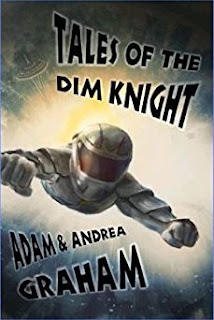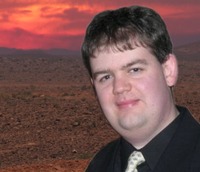Each Thursday in 2018 we will be interviewing one of the members of Christian Writers Downunder – to find out a little bit more about them and their writing/editing goals.
Today interview is with Ben Dixon (aka Wolf McTavish)
Tells us three things about who you are and where you come from, Ben.
I’ve had a lot of jobs over the years, I’ve pastored in several churches from NSW to Outback and North Queensland, but by far, my favourite job was in the Christian Bookselling industry. For over ten years I worked as a Bookshop Manager for a non-profit Christian book chain. You could say I married into it. When I moved to North Queensland to take up a position as a youth pastor I found the local Christian bookshop. There nice young lady who volunteered at this shop, and was also a member of my church, so it made visiting the shop all the more attractive.
After we married we were presented with two options, move out to a small outback mining town and continue as a pastor there or join the Christian mission as managers of a new book shop they were opening. We choose the latter. It was an interesting time. One of the things I loved about working for this small company was that there was a lot of job variety if you wanted it. I got to create several websites, train new staff and help set up shops in places like Mount Isa and Alice Springs.
By far my greatest achievement, and biggest challenge is parenting my four children and supporting my wife as she home schools them.
After we married we were presented with two options, move out to a small outback mining town and continue as a pastor there or join the Christian mission as managers of a new book shop they were opening. We choose the latter. It was an interesting time. One of the things I loved about working for this small company was that there was a lot of job variety if you wanted it. I got to create several websites, train new staff and help set up shops in places like Mount Isa and Alice Springs.
By far my greatest achievement, and biggest challenge is parenting my four children and supporting my wife as she home schools them.
Tell us about your writing. What do you write and why?
I'm currently working on an adventure novel with a fantasy twist, along with a superhero novel, a non-fiction book for home schooling dads and two science fiction novels. I think I need to focus on one and get it finished.
When I was younger I tried my hand at writing a few science fiction stories. I presented them to my Grandfather to proofread and provide some feedback. He tore my stories to shreds and went to great detail describing how scientifically impossible my stories were. I know he meant well, but it did shake my confidence in writing.
Who has read your work? Who would you like to read it?
Tell us something about your process. What challenges do you face? What helps you the most?
Process
In regards to writing a novel this is my process so far:
· I come up with an idea and think about it for a while.
· Then start world building – basically I do a mind dump and write down everything about this universe: the characters, their backgrounds, the way the magic or tech works etc.
· Start drafting out a few chapters…
· Come up with another idea and start world building that universe.
· Get distracted by life, which gets in the way and give up for a few weeks before starting the cycle again.
Challenges
My greatest challenge is completing a writing project. But I find that becoming part of a community of like-minded writers, CWD is a good example, provides the encouragement that I need, along with the opportunity to help others by sharing my knowledge and story to encourage them.
So hopefully you feel encouraged :)
Silence would help me the most, but trying to work from home with four children who don’t know the meaning of silence, is definitely a challenge.
What is your favourite Writing Craft Book and why?
If you were to give a shout-out to a CWD author, writer, editor or illustrator – who would they be?
What are your writing goals for 2019? How will you achieve them?
I believe the first and most important step to achieving this year’s goal is to finish a first draft of at least one of my projects.
(Could place image BenHeatherNatureJournal.JPG here with following link Ben and Heather with the One Year Nature Journal. Click on link to find out more and purchase in Australia.)
How does your faith impact and shape your writing?
I grew up in a Christian home and have been a Christian from an early age so I view everything that happens through a Gospel worldview and hopefully my writing and videos reflect that too. I’ve read some really good science fiction and fantasy novels which teach scientific principles or discuss philosophical and religious ideas as its part of the storyline in a way that seems natural. A good example of this, despite its name is Amish Vampires in Space which juxtaposes Amish, Christian and Secular beliefs, discusses each in detail and keeps the tension of the story going at the same time. It’s well worth the read. (See Adam Collings YouTube review for more detail)
This is what I want to do with in my novels, write them from a Gospel worldview and be able to have the characters discuss ideas like redemption or show these ideas through their actions without ‘taking the reader out of the story’ because it’s to cheesy or seems forced. This is something I’m struggling with but want to accomplish especially if I’m aiming at the general market.
---
Ben Dixon spends his days taking photos of his beard and dog to post on his Instagram page, while his wife, Heather home school's their 3 children.
He is also on a quest for a good book. While Science Fiction is his favourite genre to escape to, he also enjoy Fantasy and Detective Fiction. In the non-fiction section he likes to read Theology, History and Leadership books.
This quest is never ending as there are always more good books to read.
You can read Ben Dixon aka Wolf McTavish's work at:





































